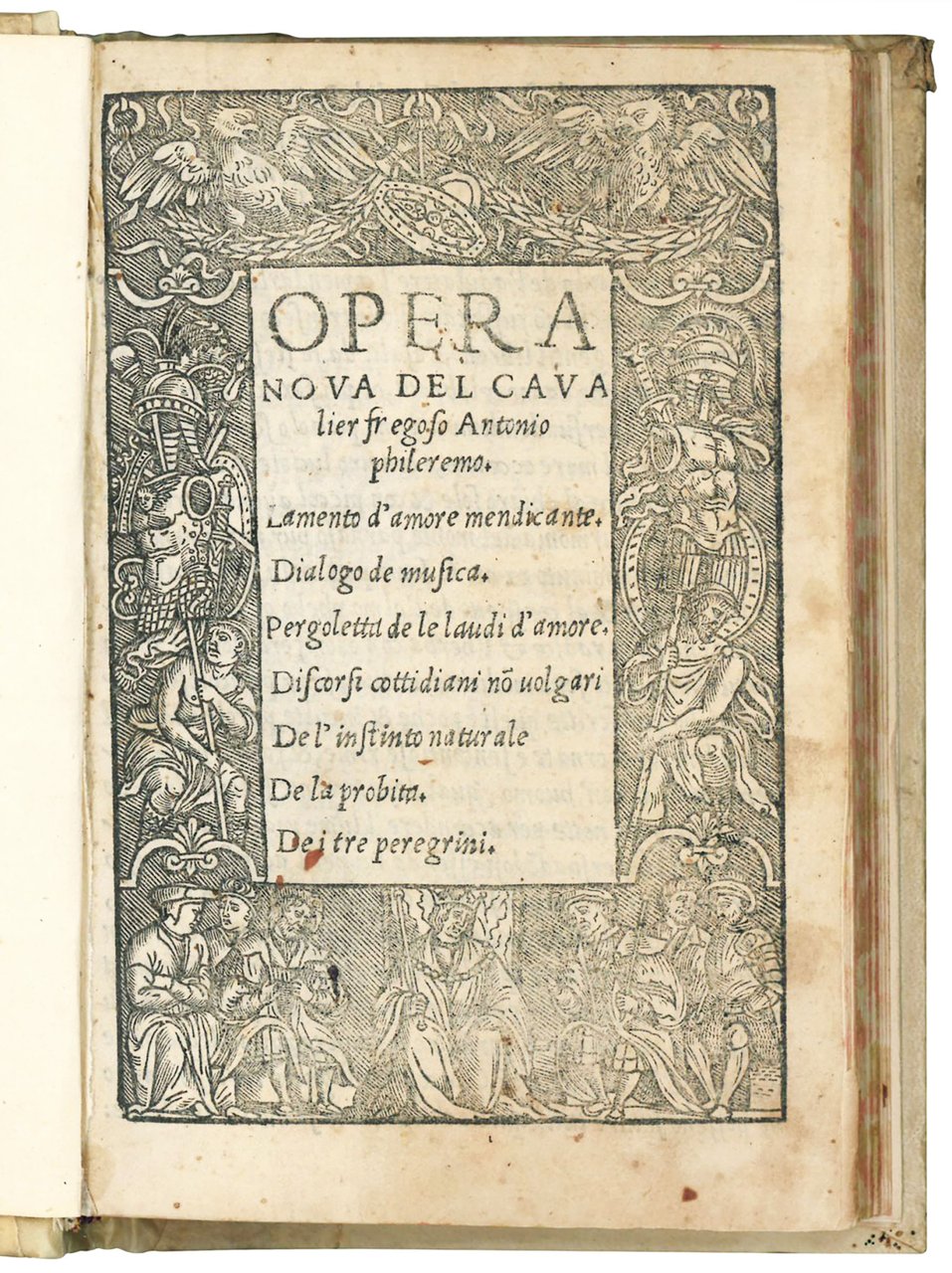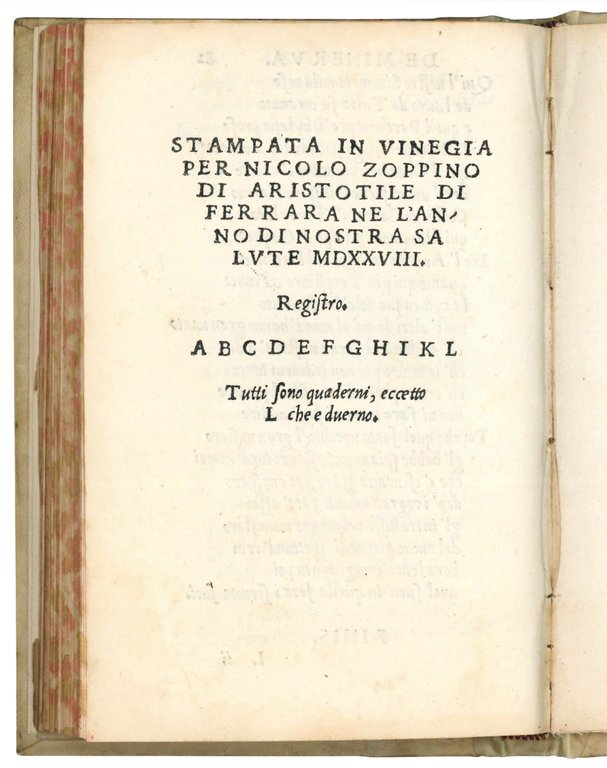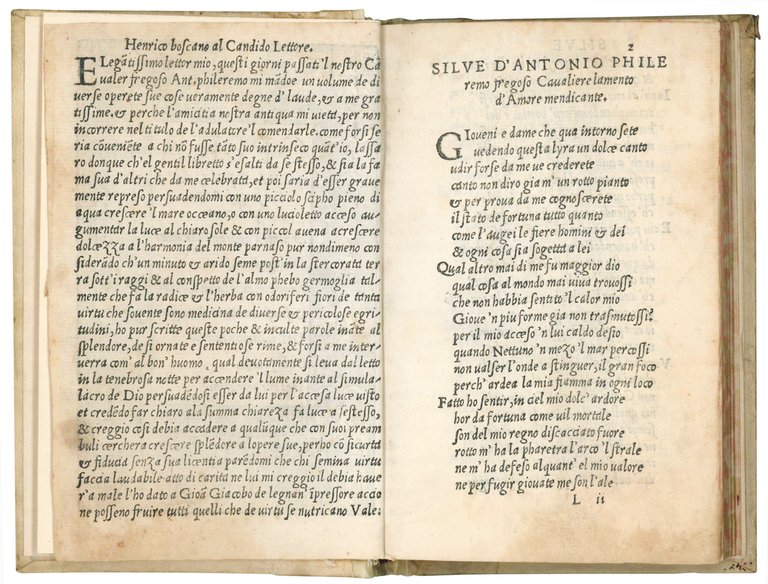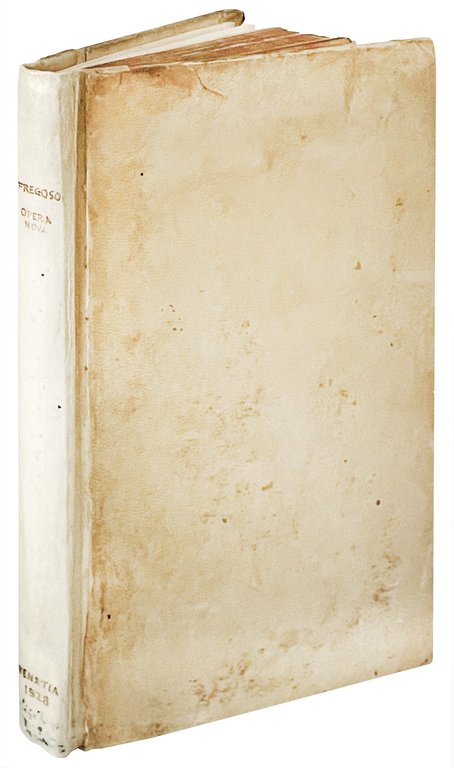Opera nova del cavalier Fregoso Antonio Phileremo. Lamento d'amore mendicante. Dialogo de musica. Pergoletta de le laudi d'amore. Discorsi cottidiani non volgari De l'instinto naturale De la probità. De i tre peregrini. Colophon: Stampata in Vinegia per Nicolo Zoppino di Aristotile di Ferrara ne l'anno di nostra salute MDXXVIII
Opera nova del cavalier Fregoso Antonio Phileremo. Lamento d'amore mendicante. Dialogo de musica. Pergoletta de le laudi d'amore. Discorsi cottidiani non volgari De l'instinto naturale De la probità. De i tre peregrini. Colophon: Stampata in Vinegia per Nicolo Zoppino di Aristotile di Ferrara ne l'anno di nostra salute MDXXVIII
Metodi di Pagamento
- PayPal
- Carta di Credito
- Bonifico Bancario
- Pubblica amministrazione
- Carta del Docente
Dettagli
- Anno di pubblicazione
- 1528
- Luogo di stampa
- Venezia
- Autore
- FREGOSO, Antonio (ca. 1460-ca. 1530)
- Editori
- Niccolò Zoppino
- Soggetto
- Quattro-Cinquecento
- Stato di conservazione
- Buono
- Lingue
- Italiano
- Legatura
- Rilegato
- Condizioni
- Usato
Descrizione
8vo (149x99 mm). 82, [2 blank] leaves. Collation: A-K8 L4. Title page within an elaborate woodcut border. Leaves L3 and L4 are blank. Colophon and register at l. L2v. Roman and italic types. Variant A before the correction of “guanci” in “guancie” in the final line of text at l. A6r. On title-page verso note to the reader by Enrico Boscano. Later stiff vellum, inked title on spine, marbled edges. Lacking a small portion of paper from the upper margin of ll. F6 and F7 with minimal loss of text, marginal staining, some occasional foxing. From the collection of the bookseller Giuseppe Martini (his pencil notes on the front flyleaves, cf. E. Barbieri, ed., Da Lucca a New York a Lugano: Giuseppe Martini libraio tra Otto e Novecento, Florence, 2017).
Rare second edition. In 1521 Fregoso vulgarised Lancino Curti's Silvae and in 1525 in Milan at Giovanni Giacomo Da Legnano and Bartolomeo da Crema's press he published his own ‘silvae', also known as Opera nova, which includes Lamento d'Amore mendicante, Dialogo de musica, Pergoletta de le laudi de Amore, Discorsi cottidiani non vulgari, De lo istinto naturale, De la probità and, finally, De i tre peregrini.
In this work, all of Fregoso's favourite themes return. Fortune, in contrast to Love, returns victorious thanks to her alliance with the blind Pluto who has wreaked havoc everywhere (Lamento d'Amore mendicante), while Platonic and Neo-Platonic concepts are repeated several times, in dialogue with Antonio Telesio and Simonetta: the correspondence between the harmony of the heavens, the harmony of nature and the harmony of the inner world (Dialogo de musica); the distinction between human and divine Love (Pergoletta de le laudi de Amore); the theory of demons that influence the actions of men according to their nature (Discorsi cottidiani non vulgari); the act of faith in the Reason innate in man, which allows even the child abandoned on the desert island to achieve his own form of education (De lo istinto naturale); the celebration of Probity, which comforts the embittered poet to flee the vanity of studies (De la Probità); and finally the fantastic journey of I tre peregrini, in which Eutimia accompanies Apuano, Filarete and Fregoso to a fair, which is the emporium of Fortune, and prevents them from buying what Fortune and Lust offer them through Epicurus, to follow instead the path of intellectual exercise and literature nourished by philosophy.
Antonio Fregoso (or Campofregoso or Fulgoso) Fileremo (or Filareno, i.e. lover of solitude) was probably born in Carrara, around 1460, the illegitimate son of Spinetta of the noble Genoese Fregoso family and lord of the city. Lacking male heirs, his father legitimised Antonio by an act later ratified by Emperor Frederick III. Spinetta, linked to the Duke of Milan Francesco Sforza, appointed in his will Cicco Simonetta as administrator of his estate and guardian of his son. After Spinetta's death in 1467, Fregoso lived with the latter in Milan. In 1472 Galeazzo Maria Sforza officially granted Milanese citizenship to Fregoso, but the following year Simonetta, as ducal minister, deprived him of Carrara and Lunigiana, which had passed to Federico Malaspina, rewarding him in exchange with the fief of Sannazzaro in Lomellina. In 1478, on the occasion of Gian Galeazzo Sforza's ducal appointment, Fregoso was made a knight. After a brief absence, he returned to Milan, where he married Fiorbellina Visconti di Lodrisio. In 1499 he swore allegiance to Louis XII when the latter conquered the Duchy of Milan, thus keeping his knighthood but losing the feud of Sannazzaro.
Fregoso then decided to retire to the villa in Colturano, on the road to Lodi, from where he sent his first works to Iafredo Carlo, president of the Milanese Senate. His retreat outside Milan did not, however, prevent him from frequenting the circles of Cecilia Gallerani and Ippolita Sforza Bentivoglio (as can be seen in the novelle I, 21 and III, 9 by M. Bandello). It is not clear what c




